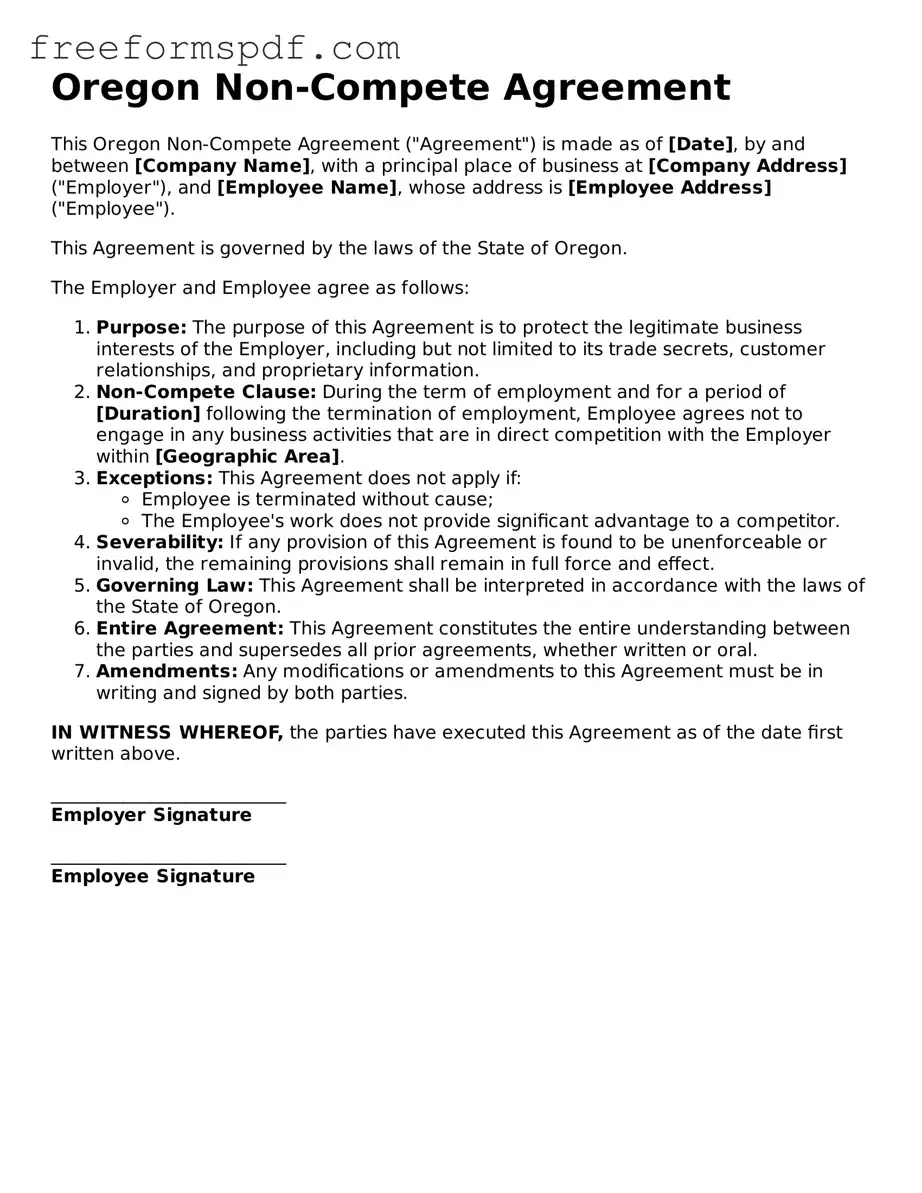Attorney-Verified Non-compete Agreement Document for Oregon State
Common mistakes
-
Failing to specify the duration of the non-compete clause. Without a clear timeline, the agreement may be deemed unenforceable.
-
Not defining the geographic scope of the non-compete. A vague description can lead to confusion and potential legal challenges.
-
Overly broad restrictions on employment. Agreements that prevent an individual from working in their field entirely are likely to be invalidated.
-
Neglecting to include consideration. The agreement must provide something of value to the employee in exchange for signing.
-
Ignoring state-specific regulations. Oregon has specific laws governing non-compete agreements that must be followed.
-
Failing to sign and date the agreement. An unsigned document may not hold up in court.
-
Not providing a copy of the signed agreement to the employee. Transparency is crucial for enforceability.
-
Using outdated templates. Legal standards evolve, and using old forms can result in mistakes.
-
Not consulting with a legal professional. Seeking advice can help ensure that the agreement is valid and enforceable.
Learn More on This Form
-
What is a Non-compete Agreement in Oregon?
A Non-compete Agreement is a legal contract between an employer and an employee. It restricts the employee from engaging in certain competitive activities after leaving the company. In Oregon, these agreements must comply with specific state laws to be enforceable.
-
What are the requirements for a Non-compete Agreement in Oregon?
In Oregon, a Non-compete Agreement must meet several criteria. It must be in writing and signed by both parties. Additionally, it should be provided to the employee at least two weeks before their employment begins. The agreement can only restrict the employee for a maximum of 18 months after leaving the company.
-
Are there any limitations on the scope of a Non-compete Agreement?
Yes, the agreement must be reasonable in scope. It should specify the geographic area where the restrictions apply and the type of work that is prohibited. The limitations should not be overly broad, as this could render the agreement unenforceable.
-
Can an employee negotiate a Non-compete Agreement?
Employees have the right to negotiate the terms of a Non-compete Agreement. It is advisable for employees to seek modifications to ensure the terms are fair and reasonable. This can include negotiating the duration, geographic limitations, or specific activities that are restricted.
-
What happens if a Non-compete Agreement is violated?
If an employee violates a Non-compete Agreement, the employer may take legal action. This could involve seeking an injunction to prevent the employee from continuing the prohibited activities or pursuing damages for any losses incurred as a result of the violation.
-
Are there exceptions to Non-compete Agreements in Oregon?
Yes, there are exceptions. For instance, if an employee is terminated without cause, the Non-compete Agreement may not be enforceable. Additionally, certain types of employees, such as those earning below a specific salary threshold, may not be subject to these agreements.
-
How can an employee determine if a Non-compete Agreement is enforceable?
To determine the enforceability of a Non-compete Agreement, employees should review the terms carefully. Consulting with a legal professional can provide clarity on whether the agreement complies with Oregon law and if it is reasonable in its restrictions.
Misconceptions
When it comes to the Oregon Non-compete Agreement form, several misconceptions can lead to confusion. Understanding the truth behind these beliefs can help individuals and businesses navigate their rights and responsibilities more effectively.
- Non-compete agreements are always enforceable in Oregon. This is not true. Oregon law has specific requirements that must be met for a non-compete agreement to be enforceable. If these conditions are not satisfied, the agreement may be invalid.
- All employees are subject to non-compete agreements. Not all employees can be bound by these agreements. In Oregon, only employees who earn a certain income level can be required to sign a non-compete agreement.
- Non-compete agreements last indefinitely. Many people believe these agreements are permanent. However, Oregon law limits the duration of non-compete agreements to a maximum of 18 months.
- Signing a non-compete means you cannot work in your field again. This is misleading. While a non-compete agreement may restrict you from working for specific competitors, it does not prevent you from working in your industry altogether.
- Non-compete agreements can be enforced without any geographical limits. In Oregon, non-compete agreements must have a defined geographic scope. Agreements that lack this specification may not be enforceable.
- Employers can change the terms of a non-compete agreement at any time. This is incorrect. Any changes to the terms of a non-compete agreement typically require the consent of both parties, ensuring fairness and clarity.
- Non-compete agreements are the same as non-disclosure agreements. While both are used to protect business interests, they serve different purposes. A non-compete agreement restricts employment opportunities, while a non-disclosure agreement focuses on confidentiality regarding sensitive information.
By addressing these misconceptions, individuals can better understand their rights and obligations under the Oregon Non-compete Agreement form. This knowledge empowers employees and employers alike to make informed decisions.
Some Other Non-compete Agreement State Templates
Noncompete New York - An employee must agree not to engage in similar business activities within a specific timeframe.
To further clarify the eviction process, utilizing resources such as the NY Templates can provide valuable guidance for landlords in creating an effective Notice to Quit form that complies with New York laws and protects their interests.
Pennsylvania Non-compete Laws - A simple understanding of what a Non-compete Agreement entails can lead to better decision-making when starting a new job.
